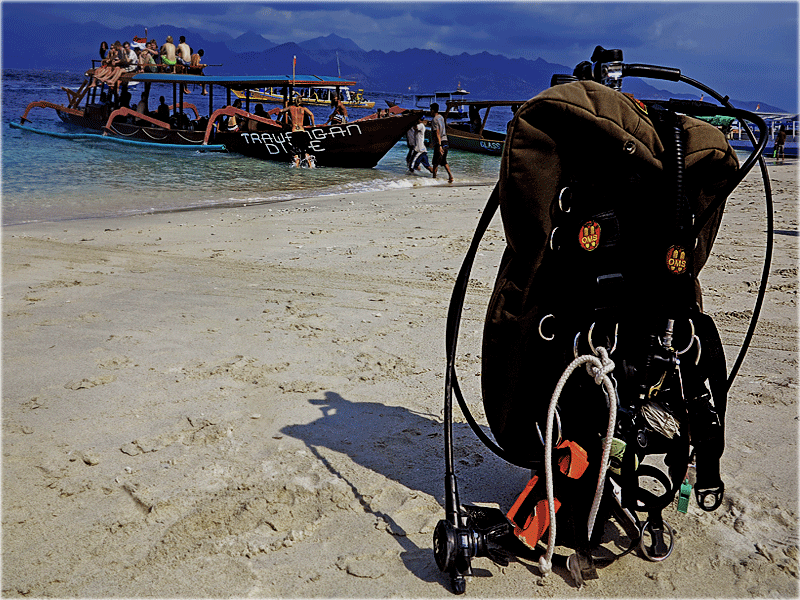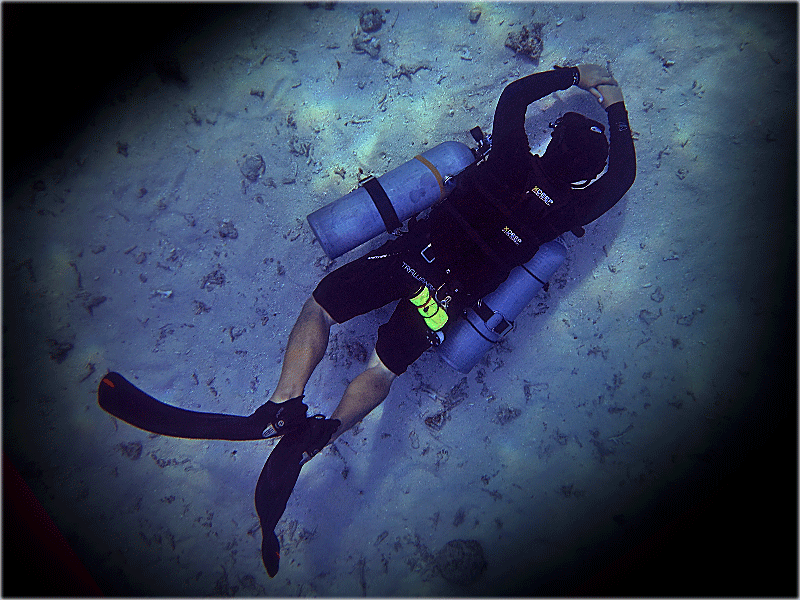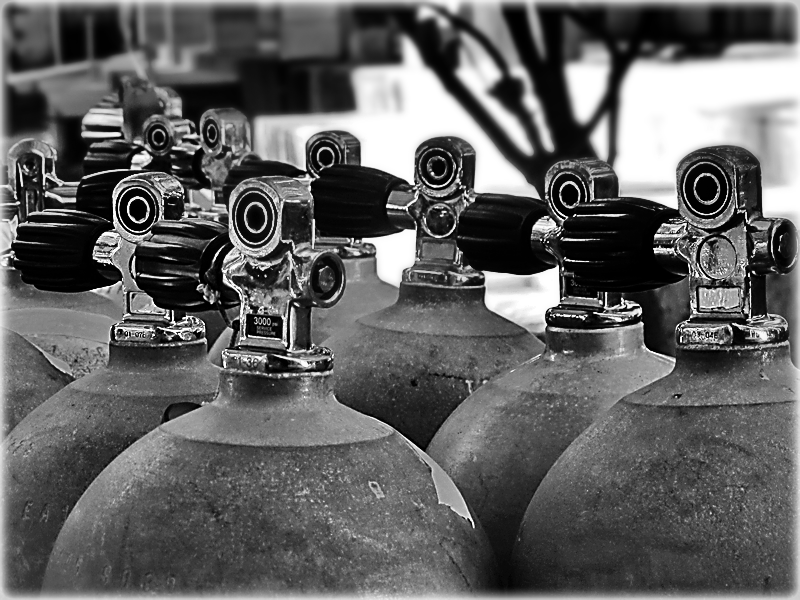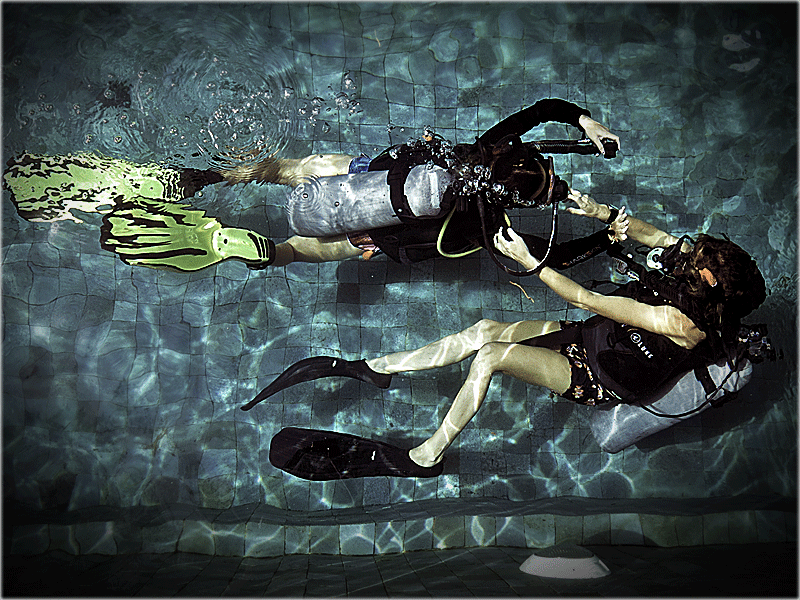Whether a fun diver, PADI Divemaster or PADI Scuba Diving Instructor it’s a great idea to buy your own equipment. Configuration might be something to think about and the requirements for a fun diver may indeed be somewhat different from a scuba diving instructor. For example a fun diver may prefer a wing type configuration, whereas a scuba instructor may prefer a jacket or hybrid type as they will be spending more time at the surface in an upright position and need to demonstrate skills to their students. So configuration aside, there are some basic principles one needs to think about when purchasing equipment.

Should I buy my scuba gear from my local dive shop?
The most common ways of buying scuba equipment are to either purchase it online or to buy it from your local dive shop. Online purchases can be a good idea if you know exactly what you want, are confident on correct size and fit and if the price is right, but there are some common pitfalls associated with online purchases. Make sure that the item is exactly what you want and make sure you have seen and tried the item in the particular size that you are ordering. I often hear stories of people who have had an item such as a wetsuit of a BCD in a certain size and decided to go online and purchase a new brand, however when they have gone to use the item concerned it turns out that another size may have been more appropriate. Other thing to consider when buying online is to make sure all the accessories are included, for example make sure a regulator includes the primary and alternate octopus. I have often seen people who find a much better price online for a regulator set, only to find that the online price did not include the alternate octopus or a BCD which did not include the weight pockets or the back plate.
Buying from your local dive shop can often be a more favored option. Not only do you get a more personal service from dive professionals who work within the industry on a daily basis, but also you will often get to try the equipment on allowing you to check the size and comfort properties. Plus you get the additional benefits of after care and service, plus people to help you if you have any issues with your purchase. Dive instructors often get updates from manufactures about the latest products and get first hand reviews from the industry and from their customers and often have direct access to distributers and the associated deals or special offers. There is also a matter of supporting your local dive shop and its staff. Diving can be a very expensive activity, not only for the customer but also for the shop. In many cases a small dive shop could be barely making ends meet, with instructors being paid very little. I have often overheard instructors saying “I’m not in it for the money, but it’s my passion”. In many places you will find that equipment sales can form the majority of an instructor’s income, and it would be a shame to see enthusiastic and passionate dive professional’s fall by the wayside.

Which Brand should I choose?
When buying equipment there are a number of factors to consider. Dive equipment should be seen as an investment and can last a long time with the correct care and servicing. You will find many seasoned dive professionals who have had the same equipment for many years. As a professional it is always a good idea to weigh up cost with time, if a piece of equipment lasts for several years and makes your life easier it will be well worth it. If on the other hand you take one dive trip a year you may wish to sacrifice the quality in respect of some financial saving.
Maintenance is also another issue. It is important to consider that most dive shops will only service brands of equipment that they retail themselves; and depending on where you are in the world, a manufacturer may not have a service center or distributer in your local area.

This can be a big problem for professionals sometimes having to send their equipment halfway round the world for repairs and servicing, leaving them out of pocket due to postage costs and having to rent a suitable replacement. Particularly in the case of professionals, it is always a good idea to purchase your dive gear in the area that you are training or working. It is also a good idea to buy the equipment from your training facility or directly from the distributer.
Again especially as a professional diver it is important to remember that your dive equipment accompanies you on every dive and can be considered an extension of you, fulfilling not only the comfort factors of your dive, but also potentially becoming your life support system . Therefore the experience properties of the dive rely heavily on the equipment, which makes your choice of equipment not only an important choice but an extremely personal choice.
There are some fantastic resources available to you before purchasing your own equipment. All manufacturers provide online specification sheets, magazines are constantly reviewing the marketplace, and of course the dive professionals themselves. Being directly on the frontline, instructors and dive masters not only get constant updates from manufacturers and distributers, they see all the latest’s equipment being tried and tested by colleagues and customers every day in the field.

New or Secondhand?
As your dive equipment can potentially become your life support it is important to exercise a degree of caution when buying used equipment. It can never be recommended to buy used equipment off of the internet where one has no idea of its usage or service history.
If buying secondhand becomes the only option than a good idea is to approach your local training facility or other dive shops in the area. You can often find good deals on ex rental equipment and although there may be an element of high usage, you are safe in the knowledge that the equipment has been regularly maintained and serviced and should you have any problems the dive shop knows the equipment.
Of course buying second hand will not usually come with a warranty of any description so, there will be additional costs should something go wrong with the item.
During the PADI IDC Gili Islands Scuba Diving Instructor Development Course (IDC) it is possible to borrow/rent equipment, but Instructor candidates are advised to bring their own equipment as this will be the equipment they will soon be using on a day to day basis.
The PADI IDC Indonesia Instructor Course takes place each and every month and is entirely conducted by Industry Leading Multiple Award Winning Platinum PADI Course Director Holly Macleod who has spent the last 17 years teaching professional and nonprofessional PADI programs and courses. For the past decade Holly has concentrated on professional Instructor training issuing well over 3000 Instructor level certifications in the Gili Islands alone, and being awarded the Platinum and Elite status for the past 7 years consecutively. During this time the program has become a popular choice for those looking to become scuba diving instructors and potential candidates can see what other thought of the program by checking out the Gili IDC Indonesia Reviews.

